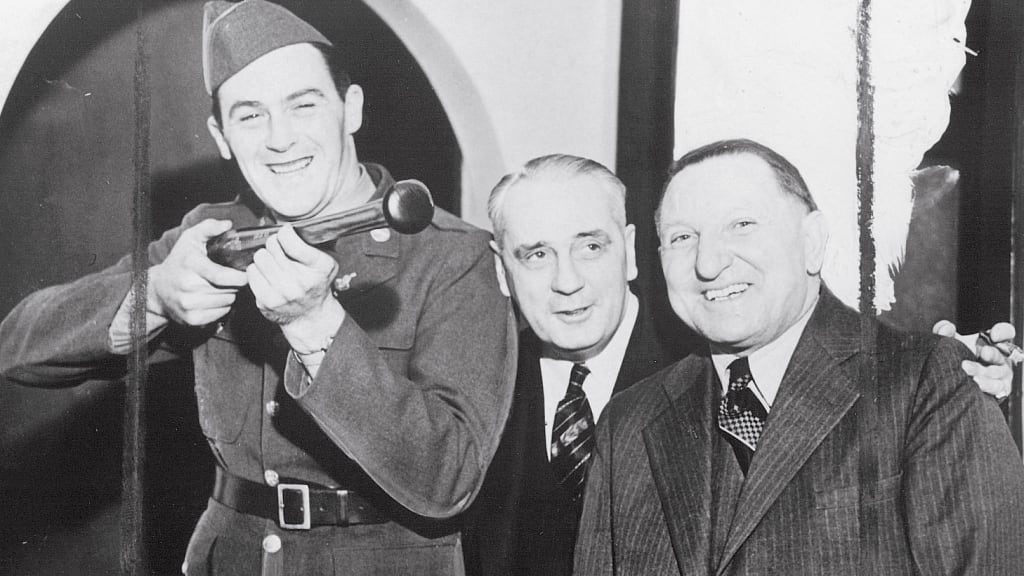
On Memorial Day, we honor the men and women who died while serving this country.
Many Major Leaguers, including several Phillies, spent time in the military. Two with Philadelphia baseball connections lost their lives.
World War I
3B Eddie Grant played for the Phillies (1907-10) before moving on to the Reds (1912-13) and Giants (1913-15). Following his baseball career, he became a lawyer. When World War I broke out, he was the first Major League player to enlist. Tragically, Captain Grant was the first Major League player killed in World War I, leading the 307th Regiment in a battle in the Argonne Forest (France) on Oct. 2, 1918.
RHP Grover Cleveland Alexander spent most of the 1918 baseball season in France as a sergeant with the 342nd Field Artillery. The future Hall of Famer was with the Cubs that year after pitching for the Phillies, 1911-17. During the war, he suffered from shell shock, partial hearing loss and increasingly worse seizures. Always a drinker, Alexander hit the bottle particularly hard after the war.
Warren Giles, former National League president and father of Bill Giles, served as an infantry officer in France.
World War II
Phillies RHP Hugh Mulcahy was the first Major League player drafted into the military during World War II on March 8, 1941. He spent 53 months in the military and earned a Bronze Medal.
Bob Carpenter Jr. was named Phillies president when his father, R.R.M. Carpenter Sr., purchased the club on Nov. 23,1943. Before being drafted into the Army the following March, Bob chose Herb Pennock as GM to run the club in his absence. A staff sergeant, Bob was discharged in 1946.
Paul Owens, who spent 48 years with the Phillies (Minor League player/manager, scout, big league general manager/manager) joined the Army after one year at Rider College. He became a sergeant of an engineering company, serving in Europe. He met his wife, Marcelle, in Belgium during the war.
OF Del Ennis, a Philadelphia native, enlisted in the Navy as an 18-year-old after his first Phillies Minor League season in Trenton (1943). Del spent the next two years in the South Pacific as a warrant officer. He was discharged in April 1946, went directly to the Majors with the Phillies, hit .313 in 141 games and was selected to the NL team for the All-Star Game.
OF Richie Ashburn was drafted by the Army during his first pro season in Utica (1945). He was allowed to finish the season and then sent to Alaska where he spent a year, missing the 1946 season. He wasn’t too thrilled about being in Alaska, saying, “Sending a ballplayer to Alaska was like sending a dog sledder to the Sahara Desert.”
RHP Robin Roberts, following graduation from high school in 1944, enrolled in the Reserve Air Corps. The Army sent him to Michigan State University where he attended classes and received initial military training. Robbie wasn’t called to active duty. His dad, Tom, served in the British Army during World War I.
Among others who served their country during this war and later played for the Phillies are RHP Jim Konstanty, 1B Eddie Waitkus, INF Jimmy Bloodworth, C-CH Ken Silvestri and LHP Ken Heintzelman.
C Harry O’Neill, a Philadelphia native, played in just one Major League Baseball game, not with the Phillies but the Philadelphia Athletics, July 23, 1939. No at-bat, putouts or assists. He became one of only two Major Leaguers who lost their lives during World War II. He was killed in action on March 6, 1945, during the battle of Iwo Jima. His name is linked forever to that of Elmer Gedeon, an Army Air Forces pilot who was killed while flying a B-26 bomber over France on April 20, 1944. Gedeon was an outfielder who played five games with the 1939 Washington Senators.
** Because of WW II, rosters were in flux and the Phillies were a prime example. 2B Danny Murtaugh, 3B Pinky May and RF Ron Northey were the only returning regulars. A total of 18 Phillies were in the military in 1943, something all teams experienced.
Korean War
LHP Curt Simmons had a 17-8 record on the 1950 Whiz Kids when his National Guard unit was activated. His last start was Sept. 9. He didn’t pitch again in the Majors until 1952. Simmons was granted a 10-day pass during the World Series, but he was ruled ineligible.
Vietnam War
Following graduation from Denison University, Bill Giles was in the U.S. Air Force, 1957-59. He served as a navigator for the Strategic Air Command. He began his baseball career as GM of the Nashville Volunteers following his discharge in 1959.